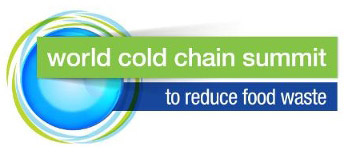Refrigeration key to reducing food waste
6th January 2016 SINGAPORE: A third or more of annual food production is never eaten, yet more than 50% of the wasted food could have its shelf-life extended by the cold chain.
SINGAPORE: A third or more of annual food production is never eaten, yet more than 50% of the wasted food could have its shelf-life extended by the cold chain.
This was one of the messages to come out of US air conditioning and refrigeration manufacturer Carrier’s World Cold Chain Summit to Reduce Food Waste in Singapore last month.
The conference, which was held for the first time in Asia, convened 131 delegates from 33 nations, including global leaders in the supply chain private sector, academia and government to discuss and develop scalable, sustainable solutions to expand and improve the cold chain to reduce food loss and waste.
Keynote speakers at the two-day conference included Dr Joseph Mpagalile, agro-food Industries officer, Food and Agriculture Organisation of the United Nations (FAO); Didier Coulomb, general director of the International Institute of Refrigeration; and Clementine O’Connor, sustainable food systems consultant, United Nations Environment Programme (UNEP).
The Summit endorsed the new United Nations Sustainable Development Goal that calls for halving food waste at retail and consumer levels, as well as reducing food losses along the entire global food supply chain, by 2030.
With the FAO considering a new Cold Chain Coalition to fight food waste in developing countries, Didier Coulomb revealed that the International Institute of Refrigeration estimates that 23% of food loss and waste in developing countries is due to the lack of a cold chain.
A new, independent study predicting a 10-fold net reduction in greenhouse gas emissions from food waste if developing countries had the same level of cold chain implementation as the developed world was also discussed. This was seen as evidence that a green cold chain could be effective not only in feeding more people, but taking a bite out of the 3.6 gigatons of CO2 associated with food waste every year.
Another speaker, Professor Judith Evans of London South Bank University, revealed that in developed countries, 42% of food waste happens at the household level, suggesting the need for greater consumer awareness. The UK awareness campaign Love Food Hate Waste is credited with reducing household food waste by 21% since 2010.
“One third or more of the food we produce each year is never eaten, yet more than 50% of the wasted food can have its shelf life extended by the cold chain,” said David Appel, president, Carrier Transicold & Refrigeration Systems. “Only 10% of worldwide perishable foods are refrigerated today, so there is immense opportunity to cut food waste and the resulting greenhouse gas emissions by implementing or improving the cold chain.”

“We know there are many reasons why food is lost or wasted – but among them is the lack of or the underdevelopment of the cold chain,” said John Mandyck, UTC chief sustainability officer and co-author of Food Foolish: The Hidden Connection Between Food Waste, Hunger and Climate Change.
“Refrigeration is the best technology to ensure food safety for perishable goods and prolong its shelf life. That’s why this Summit is so important, as it helps connect a global dialogue on how we can sustainably grow the cold chain – which in turn, can reduce food waste and feed a growing population with fresh foods containing necessary micronutrients for good health and development.
“Over the last 20 years,” Mandyck added, “we’ve experienced the “Age of Energy Efficiency,” taking the same power base and spreading it more efficiently to urbanise in a sustainable manner. Energy efficiency has gone far, with more to go. It is now time for the “Age of Food Efficiency,” using the same food supply base that produces enough to feed 10 billion people – enough for those on the planet today and enough for those that will join us in 2050 – and in the process avoid more production and environmental emissions that come with it. The potential to extend food supplies, with the help of an improved green cold chain, is extraordinary.”







